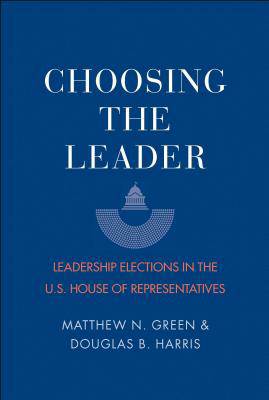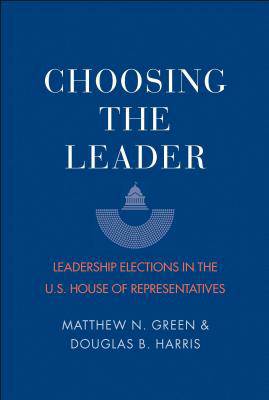
Je cadeautjes zeker op tijd in huis hebben voor de feestdagen? Kom langs in onze winkels en vind het perfecte geschenk!
- Afhalen na 1 uur in een winkel met voorraad
- Gratis thuislevering in België vanaf € 30
- Ruim aanbod met 7 miljoen producten
Je cadeautjes zeker op tijd in huis hebben voor de feestdagen? Kom langs in onze winkels en vind het perfecte geschenk!
- Afhalen na 1 uur in een winkel met voorraad
- Gratis thuislevering in België vanaf € 30
- Ruim aanbod met 7 miljoen producten
Zoeken
Choosing the Leader
Leadership Elections in the U.S. House of Representatives
Matthew N Green, Douglas B Harris
Paperback | Engels
€ 38,45
+ 76 punten
Omschrijving
The first comprehensive study in more than forty years to explain congressional leadership selection How are congressional party leaders chosen? In the first comprehensive study since Robert Peabody's classic Leadership in Congress, political scientists Matthew Green and Douglas Harris draw on newly collected data about U.S. House members who have sought leadership positions from the 1960s to the present--data including whip tallies, public and private vote commitments, interviews, and media accounts--to provide new insights into how the selection process truly works. Elections for congressional party leaders are conventionally seen as a function of either legislators' ideological preferences or factors too idiosyncratic to permit systematic analysis. Analyzing six decades' worth of information, Harris and Green find evidence for a new comprehensive model of vote choice in House leadership elections that incorporates both legislators' goals and their connections with leadership candidates. This study will stand for years to come as the definitive treatment of a crucial aspect of American politics.
Specificaties
Betrokkenen
- Auteur(s):
- Uitgeverij:
Inhoud
- Aantal bladzijden:
- 320
- Taal:
- Engels
Eigenschappen
- Productcode (EAN):
- 9780300222579
- Verschijningsdatum:
- 22/01/2019
- Uitvoering:
- Paperback
- Formaat:
- Trade paperback (VS)
- Afmetingen:
- 137 mm x 208 mm
- Gewicht:
- 362 g

Alleen bij Standaard Boekhandel
+ 76 punten op je klantenkaart van Standaard Boekhandel
Beoordelingen
We publiceren alleen reviews die voldoen aan de voorwaarden voor reviews. Bekijk onze voorwaarden voor reviews.









